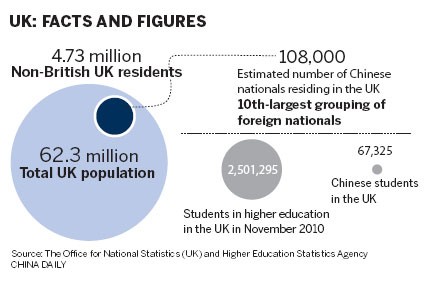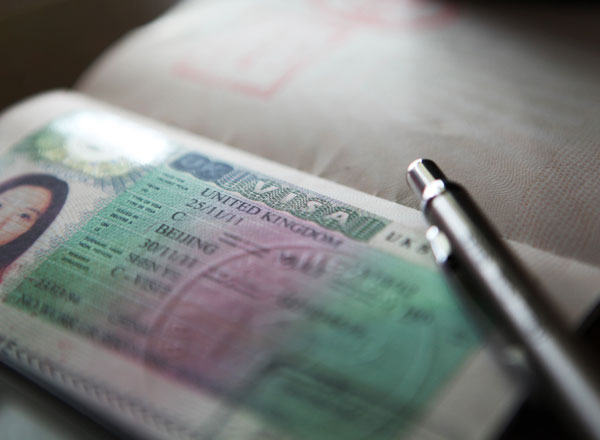Visa hopefuls bordering on despair as UK tightens policy
Updated: 2012-07-18 09:49
By Zhang Haizhou (China Daily)
|
|||||||||||
Tougher regulations make it harder to enter and live in Britain, Zhang Haizhou reports.
Wang Jianyu, 30, sounded deeply frustrated on the other end of the phone as he admitted that he had not yet been granted a permanent residence visa for Britain.
"Not yet. It's been five months already," sighed Wang in a low, quiet voice. "The first thing I do every day when I get home from work is check the mail to see if there's a big envelope with my passport inside. But nothing has arrived, so far."
Having lived in Britain for more than 10 years, Wang, a salesman for a London company, has a valid work permit that he obtained five years ago. He is now eligible for permanent residency.
He did not expect such a long delay and has been forced to postpone a summer trip home to Tianjin.
"I don't know how long I will need to wait. It just seems indefinite," Wang, who has only been home twice in 10 years, said. "It's just bad luck that I submitted my application just when Britain is cutting back on immigration."
The program to tighten border controls began two years ago when the Conservative-Liberal Democrat coalition took office.
During the election campaign, David Cameron, now the UK Prime Minister, said he wanted to reduce net annual migration - the number of immigrants entering the country minus the number of emigrants - from hundreds of thousands to tens of thousands.
Excluding visitor and transit visas, 13 percent fewer visas (529,000) were issued in the year ending March 2012 than in the previous 12 months (609,000), according to the Home Office. This reduction includes a 21 percent decrease in "study" visas, 8 percent in "work" and 16 percent in the "family" category.
The tightening will also affect Chinese expats. About 108,000 Chinese nationals now live in the UK, most of whom are students, according to the UK Office for National Statistics.
Meanwhile, the number of Chinese students in the UK higher education system rose to 67,325 in the 2010-11 academic year, an increase of 43 percent from 2008-09, according to the Higher Education Statistics Agency.
|
 |
The total number of Chinese applicants for UK student visas is expected to reach 100,000 this year, according to Philip Hao, CEO of the UK Visa and International Education Centre in London.
"The impact has yet to appear," said Hao, explaining that this is because of flourishing cooperation in educational matters, such as joint degrees, between Chinese and British institutions during recent years.
The abolition of the post-study work visa in April will also have some impact on students who want to study through the joint degree program in future, he added.
"Almost all of the top 400 Chinese institutions are cooperating overseas and things are blossoming right now. Irrespective of any policy changes, those already enrolled on joint degree courses (two or three years in China, and one or two more years at a UK institution) will certainly come," said Hao.
The closure of the post-study work visa route means that overseas students who graduate from British universities will no longer be allowed to stay for two years after graduation to look for work.
But post-study work opportunities remain available for applicants. The "brightest and best students", or "Tier 1 Exceptional Talent" in official jargon, will be eligible to apply to stay in the UK.
Other international students graduating from UK universities will still be able to take up post-study employment only if they can get Tier 2 Skilled Worker visa under a more selective system.
More than 184,000 post-study work visas were granted between 2004 and 2011, according to Migration Watch UK, an independent think tank. However, the abrupt closure of the route may lead to a decrease in the number of Chinese applicants to British universities.
"Those who want to apply for joint degrees may have to consider whether they should still do so, or turn to the US or Australia instead. The number of Chinese applicants to the UK will consequently fall," said Hao.
Meanwhile, a coalition of British universities has warned that tighter visa restrictions for international students will cost universities between 5 and 8 billion pounds ($7.8 billion to $12.5 billion) a year.
As non-European Union students can be charged up to four times the tuition fee levied on a British student, universities depend on international students as a major source of income. Some universities are already reporting a 40 percent decline in overseas applications.
"A 40 percent drop is going to cause a university to respond pretty rapidly," said Professor Eric Thomas, president of Universities UK and vice-chancellor of the University of Bristol. "There aren't that many income streams for universities to grow in the current economic climate."
Thomas wrote to Cameron in May to point out that Chinese and Indian students, the biggest contributors to the 5 billion-plus pounds earned from international students each year, view the move as the UK "putting up barriers to entry".
Today's Top News
President Xi confident in recovery from quake
H7N9 update: 104 cases, 21 deaths
Telecom workers restore links
Coal mine blast kills 18 in Jilin
Intl scholarship puts China on the map
More bird flu patients discharged
Gold loses sheen, but still a safe bet
US 'turns blind eye to human rights'
Hot Topics
Lunar probe , China growth forecasts, Emission rules get tougher, China seen through 'colored lens', International board,
Editor's Picks

|

|

|

|

|

|






